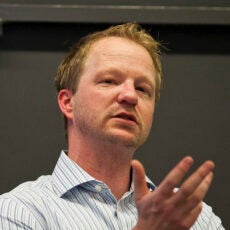Watch the recording.
The Local Economic Effects of Fracking
Event Summary
What is the net economic balance of hydraulic fracturing? In this public Kleinman lecture, Professor Knittel examines potential benefits and costs of hydraulic fracturing. Economic benefits such as income from leasing land or mineral rights and rising local labor demand are quantified, analyzed and compared to the potential costs of water contamination, seismic activity, air pollution and other negative social externalities.
Christopher Knittel is the William Barton Rogers Professor of Energy Economics in the Sloan School of Management at the Massachusetts Institute of Technology and Co-Director of the Center for Energy and Environmental Policy Research (CEEPR). He co-leads the MIT Energy Initiative (MITEI) Utility of the Future study and serves on the Energy Education Task Force. He joined the faculty at MIT in 2011, having taught previously at UC Davis and Boston University. His research focuses on environmental and energy economics, industrial organization, and applied econometrics. He is a Research Associate at the National Bureau of Economic Research in the Productivity, Industrial Organization, and Energy and Environmental Economics groups. Professor Knittel received his B.A. in economics and political science from the California State University, Stanislaus in 1994 (summa cum laude), an M.A. in economics from UC Davis in 1996, and a Ph.D. in economics from UC Berkeley in 1999.
Christopher Knittel
William Barton Rogers Professor of Energy Economics, MITChristopher Knittel is the William Barton Rogers Professor of Energy Economics in the Sloan School of Management at the Massachusetts Institute of Technology and Co-Director of the Center for Energy and Environmental Policy Research (CEEPR).

